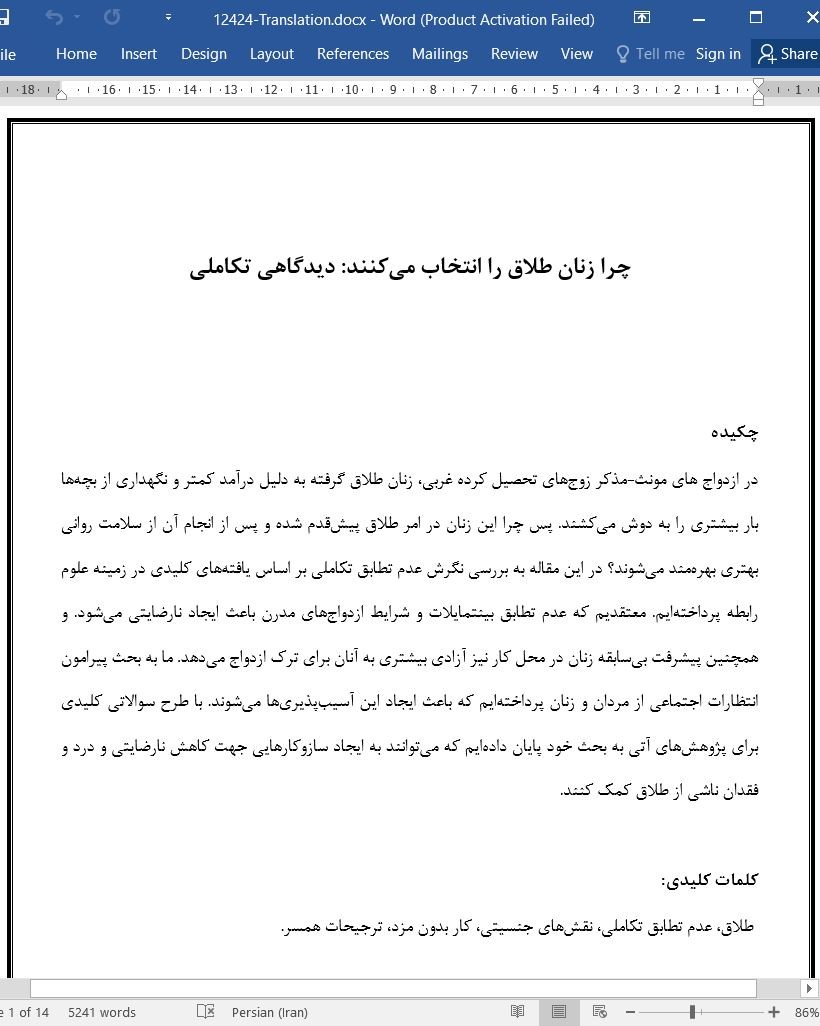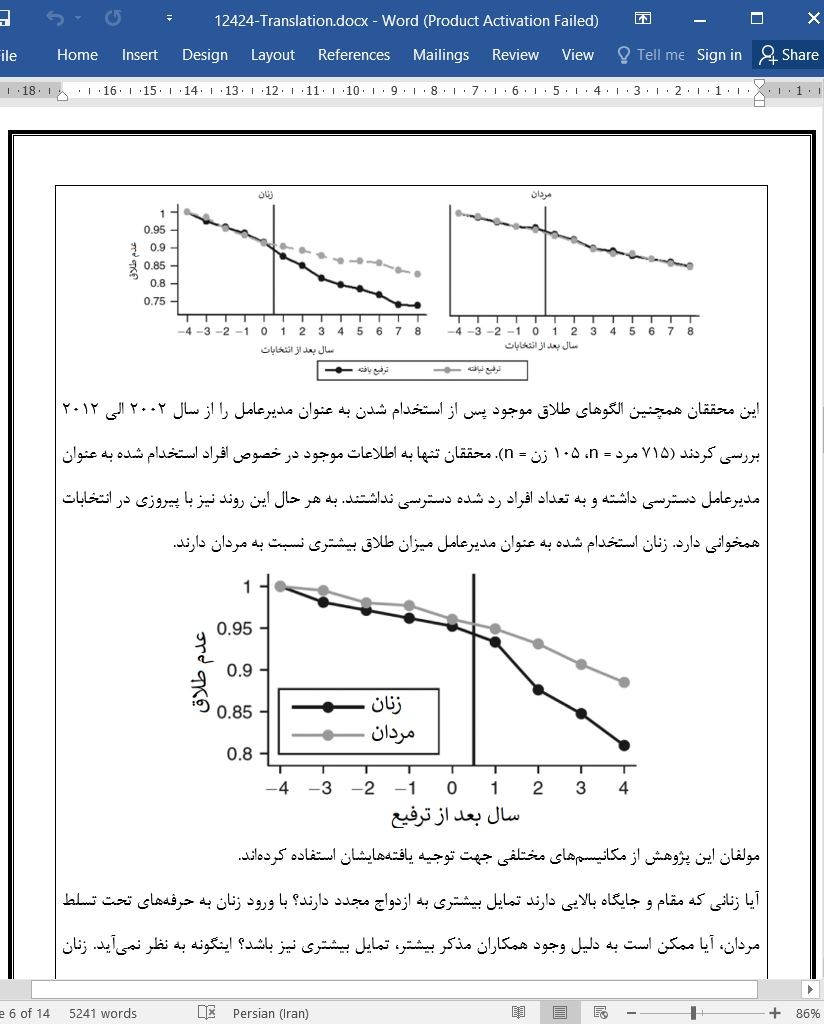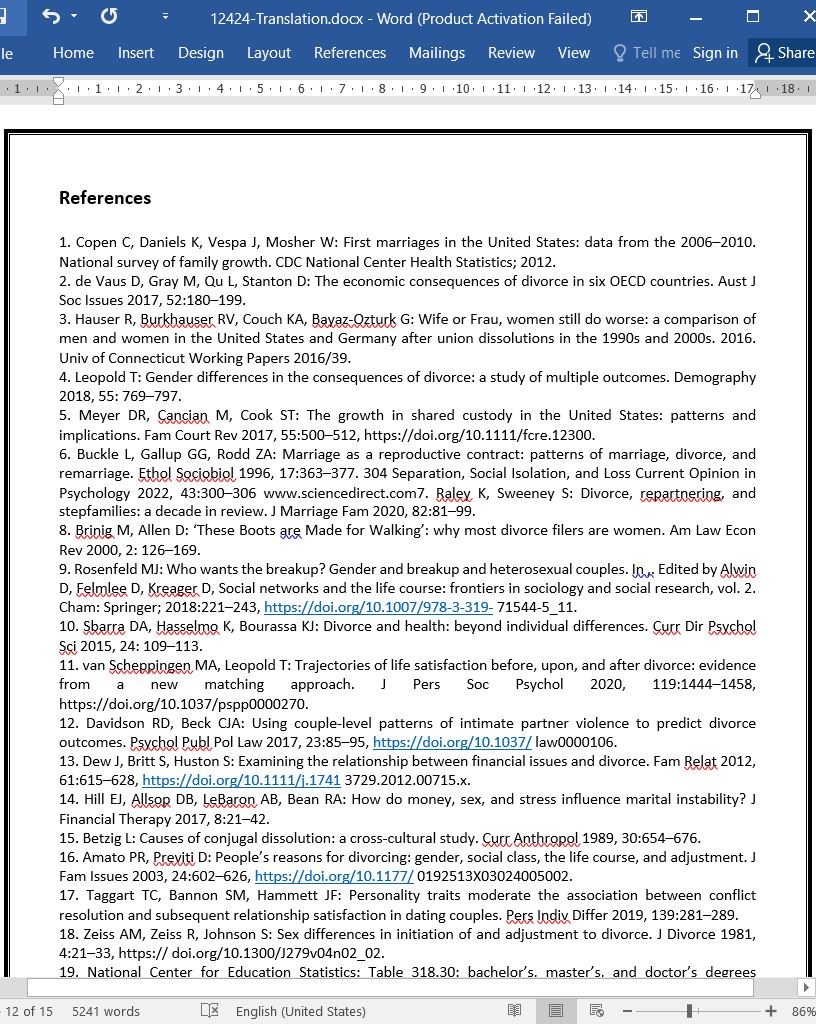
چرا زنان طلاق را انتخاب می کنند: دیدگاهی تکاملی
چکیده
در ازدواج های مونث-مذکر زوج های تحصیل کرده غربی، زنان طلاق گرفته به دلیل درآمد کمتر و نگهداری از بچه ها بار بیشتری را به دوش می کشند. پس چرا این زنان در امر طلاق پیش قدم شده و پس از انجام آن از سلامت روانی بهتری بهره مند می شوند؟ در این مقاله به بررسی نگرش عدم تطابق تکاملی بر اساس یافته های کلیدی در زمینه علوم رابطه پرداخته ایم. معتقدیم که عدم تطابق بینتمایلات و شرایط ازدواج های مدرن باعث ایجاد نارضایتی می شود. و همچنین پیشرفت بی سابقه زنان در محل کار نیز آزادی بیشتری به آنان برای ترک ازدواج می دهد. ما به بحث پیرامون انتظارات اجتماعی از مردان و زنان پرداخته ایم که باعث ایجاد این آسیب پذیری ها می شوند. با طرح سوالاتی کلیدی برای پژوهش های آتی به بحث خود پایان داده ایم که می توانند به ایجاد سازوکارهایی جهت کاهش نارضایتی و درد و فقدان ناشی از طلاق کمک کنند.
مقدمه
زمانی که افراد قصد ازدواج دارند، نیت آنان اصولا زندگی مشترک تا آخر عمر می باشد- یعنی تا دم مرگ. هرچند حدودا نصف ازدواج ها در ایالات متحده به طلاق ختم می شوند (1). این مسئله برای هر دو طرف، علی الخصوص زنان گران تمام می شود.
در زوجین دگرجنس گرای غربی، زنان نسبت به مردان پس از طلاق کاهش بسیار بیشتری در سطح درآمد خود تجربه می کنند (2،3)، و خطر سقوط آنان به زیر خط فقر بیشتر می شود (4) . از سوی دیگر، حقوق مردان کاهش کمی داشته (2،3) و یا در برخی اوقات افزایش می یابد (4). زنان معمولا به تنهایی سرپرستی کودکان را به عهده گرفته و یا سرپرست نخست آنان می شوند (5) و احتمال ازدواج مجدد آنان کمتر است (6،7). لذا طلاق بار مضاعفی برای زنان دارد، چرا که آنان می بایست هم کار کرده و هم بدون هیچ درآمدی با منابع مالی کمتر نسبت به مردان از کودکان مراقبت کنند. با وجود این هزینه ها، زنان اشتیاق بیشتری به طلاق داشته (8،9) و نسبت به مردان رضایت بیشتری از زندگی پس از طلاق دارند (10،11). این پدیده نشانگر وجود پارادوکس در طلاق غربی حال حاضر می-باشد. با وجود صدمات بیشتر برای زنان، چرا آنان عمدتا میل بیشتری به طلاق داشته و از لحاظ روانی از آن سود می گیرند؟
Abstract
In Western dual-educated, male-female marriages, women who divorce face greater burdens because of decreased income and primary or sole responsibility for caring for children than men who divorce. Why, then, do these women initiate divorce more and fare better psychologically after a divorce than men? Here, we articulate an evolutionary mismatch perspective, informed by key findings in relationship science. We argue that mismatches between women's evolved preferences and configurations of modern marriage often clash, producing dissatisfaction. Women's unprecedented career ascendance also affords women ever more freedom to leave. We discuss pressures from social expectations for men and women that contribute to or compound these vulnerabilities. We conclude with key questions for future research, which can contribute to strategies for mitigating relationship dissatisfaction and the profound loss and pain that results from divorce.
Introduction
When people choose to get married, typically they do so with the intention of staying together forever d ‘till death do us part.’ Nevertheless, roughly half of marriages in the US end in divorce [1]. This is costly to all involved, particularly to women.
Post-divorce, within Western heterosexual couples, women experience a significant decrease in income compared to men [2,3], and their risk of falling below the poverty line skyrockets [4].1 In contrast, Western men’s income decreases modestly [2,3] or increases [4]. Women often take sole or primary custody of children [5] and are less likely to remarry [6,7]. Therefore, divorce involves a compound burden for many women, juggling both paid labor and most of the unpaid childcare work with fewer resources than are typically available to divorced men. Despite these costs, women are more likely to initiate divorce [8,9] and report greater life satisfaction post-divorce [10,11] than men. This represents a paradox of contemporary, Western divorce. Given the greater costliness of marital dissolution for women, why are women more often its initiators and psychological beneficiaries?
چکیده
مقدمه
زنان در محل کار: ویژگی جدید دنیای مدرن
چالش های به وجود آمده از عدم تطابق تکاملی و از بین رفتن وابستگی متقابل
عدم تطابق در تمایلات همسر
تمایلات در منابع
تمایل به شاخص های ژن خوب
عدم تطابق مراقبتی
بینشی فراتر از علم روابط: کاهش وابستگی متقابل بین طرفین
تلاش برای ایجاد راه حل
حذف هنجارهای جنسیتی
کمک به امر مراقبت از فرزند
تفاهم در زمینه تخصص و وابستگی متقابل
فرادانش در خصوص عدم تطابق
نتیجه گیری
منابع
Abstract
Introduction
Women in the workplace: a new feature of the modern world
Challenges created by evolutionary mismatches and eroding interdependence
Mate preference mismatch
Preference for resources
Preference for indicators of good genes
Caregiving mismatch
Further insight from relationship science: decreasing interdependence between partners
Working toward solutions
Undoing gendered norms
Childcare assistance
Agreements about specializations and interdependence
Meta-knowledge about mismatches
Conclusions
References
- اصل مقاله انگلیسی با فرمت ورد (word) با قابلیت ویرایش
- ترجمه فارسی مقاله با فرمت ورد (word) با قابلیت ویرایش، بدون آرم سایت ای ترجمه
- ترجمه فارسی مقاله با فرمت pdf، بدون آرم سایت ای ترجمه



